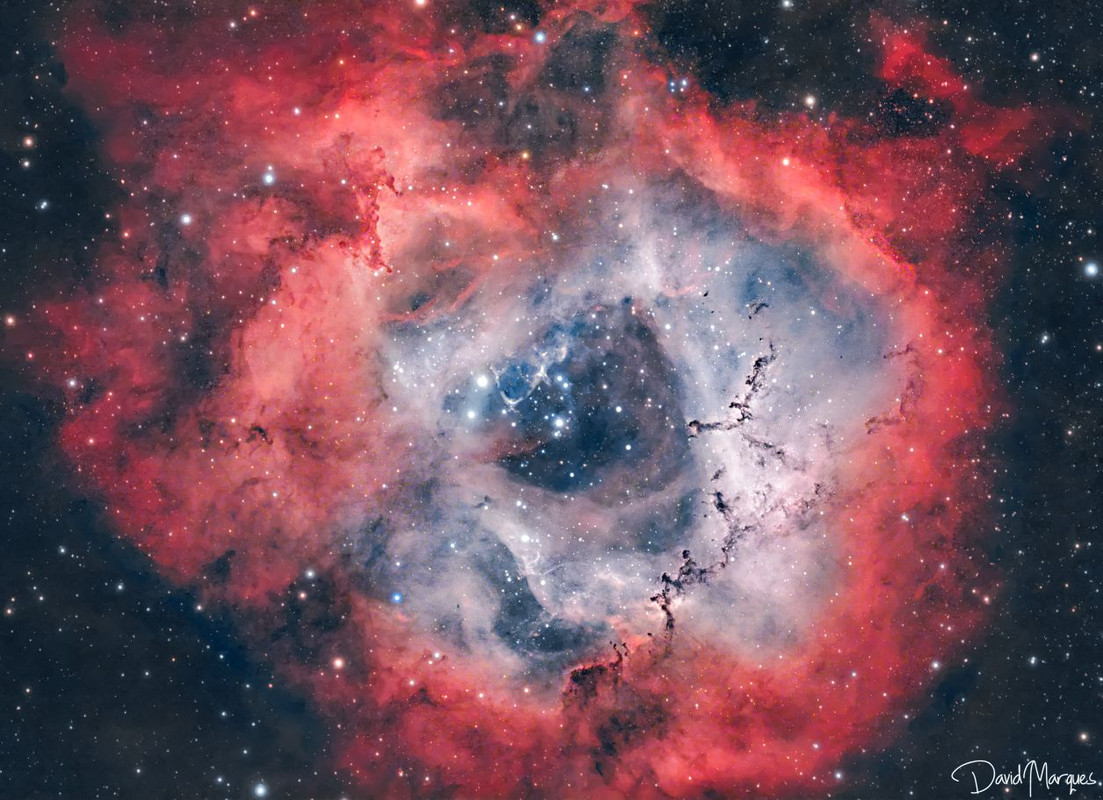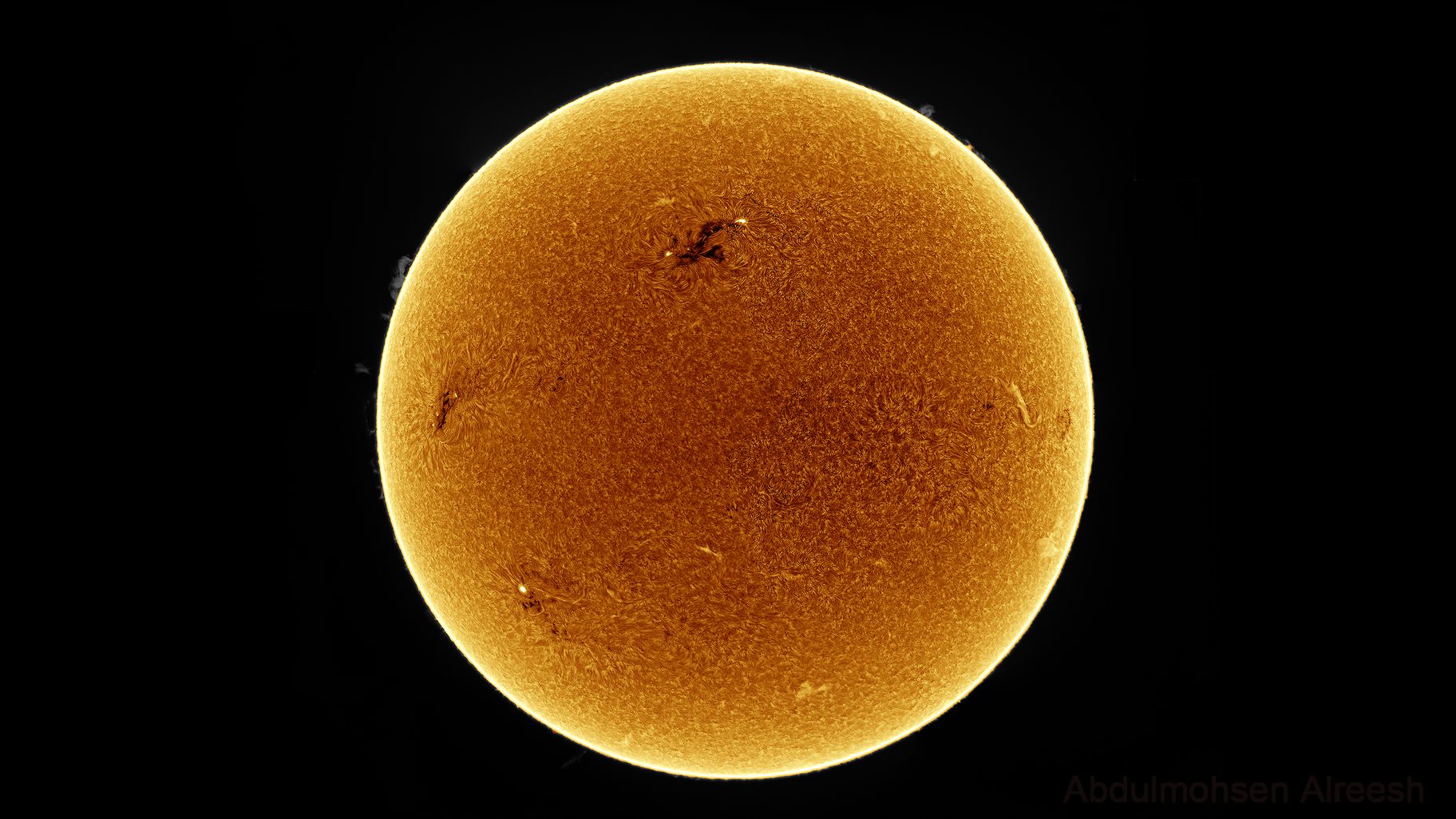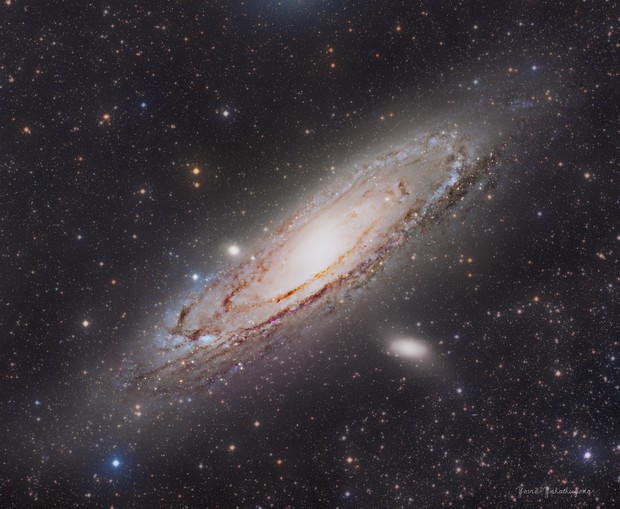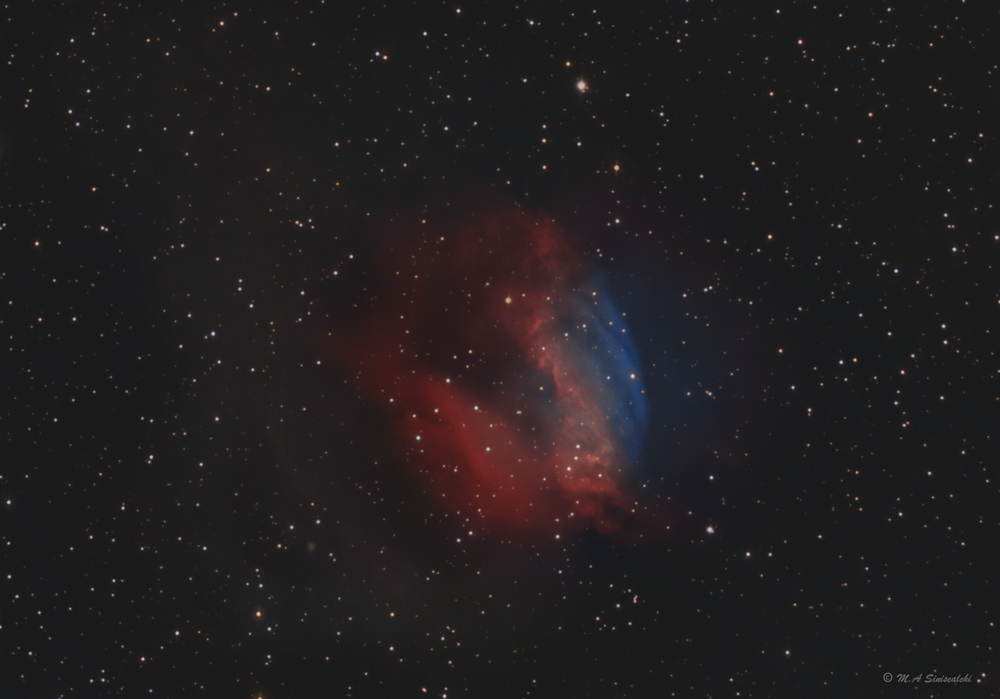Submissions: 2022 February
Re: Submissions: 2022 February
Big Valentine Kiss!
Headphone Nebula - PK 164+31.1
HaOIII with RGB stars
https://www.astrobin.com/334569/
Nick Pavelchak
Headphone Nebula - PK 164+31.1
HaOIII with RGB stars
https://www.astrobin.com/334569/
Nick Pavelchak
-
Abdulmohsen Alreesh
Re: Submissions: 2022 February
Eiffel Tower of the sun. it's quite interesting seeing solar activity especially when it reminds us of things on our home spaceship. what's mind boggling is this eiffel tower of fire so so big it could easily engulf our tiny planet.
imaged on February 7th 2022 from Kuwait City
Equipment used Lunt LS100MT
rainbow rst-135 mount
zwo asi 174mm
televue 2.5x barlow
Thank you,
Abdulmohsen Alreesh
feel free to see more of my work on instagram
@mi7sen89 on instagram
imaged on February 7th 2022 from Kuwait City
Equipment used Lunt LS100MT
rainbow rst-135 mount
zwo asi 174mm
televue 2.5x barlow
Thank you,
Abdulmohsen Alreesh
feel free to see more of my work on instagram
@mi7sen89 on instagram
Re: Submissions: 2022 February
NGC 2841 - Tiger's Eye Galaxy
Equipment:
Celestron EdgeHD 14 + 0.7x Reducer
SkyWatcher EQ8-Rh
QHY 16200A
High Quality and more info:
https://www.astrobin.com/5mmm3q/
Clear skies
Anas
Equipment:
Celestron EdgeHD 14 + 0.7x Reducer
SkyWatcher EQ8-Rh
QHY 16200A
High Quality and more info:
https://www.astrobin.com/5mmm3q/
Clear skies
Anas
Re: Submissions: 2022 February
Hi everyone!
This picture of the Rosettte Nebula was taken in Portugal on 27-01-2022. A cold night where I shot 3h10 minutes of data.
I used an Astro STC Dual Narrowband filter in order to capture more details on the Ha and OIII wave lenght.
This huge and beautiful molecular cloud lies about 5.000 light years away from us, and can be seen in the sky on the constellation Monoceros.
“Rosette Nebula” (link for Download with better quality) – https://2u8tv7.s.cld.pt
Also in Astrobin : https://astrob.in/gbvx2i/0/
Equipment used :
Telescope: TS APO 65 (65mm)
Camera: QHY183
Mount: Skywatcher EQ6 R Pro
Guiding: ZWO ASI 120 MC + Orion 50 mm Guidescope
Software: APT Astrophotography Tool ; PHD2; AstroPixel Processor ; Photoshop
Filters: STC Dualnarrowband
Frames: 19x600" (3h 10')
Sky light pollution : Bortle 3
Wish you a great day.
This picture of the Rosettte Nebula was taken in Portugal on 27-01-2022. A cold night where I shot 3h10 minutes of data.
I used an Astro STC Dual Narrowband filter in order to capture more details on the Ha and OIII wave lenght.
This huge and beautiful molecular cloud lies about 5.000 light years away from us, and can be seen in the sky on the constellation Monoceros.
“Rosette Nebula” (link for Download with better quality) – https://2u8tv7.s.cld.pt
Also in Astrobin : https://astrob.in/gbvx2i/0/
Equipment used :
Telescope: TS APO 65 (65mm)
Camera: QHY183
Mount: Skywatcher EQ6 R Pro
Guiding: ZWO ASI 120 MC + Orion 50 mm Guidescope
Software: APT Astrophotography Tool ; PHD2; AstroPixel Processor ; Photoshop
Filters: STC Dualnarrowband
Frames: 19x600" (3h 10')
Sky light pollution : Bortle 3
Wish you a great day.
-
Michael Tz
- Asternaut
- Posts: 9
- Joined: Mon Jan 31, 2022 5:19 pm
Re: Submissions: 2022 February
Mr Moon from last night.
Photographed it with sct 11"
The seeing was 3/5 but still, I got nice details on the craters.
5min video 20% only stacked.
Thank you,
https://www.instagram.com/your.daily.astro/
7.2.2022
Photographed it with sct 11"
The seeing was 3/5 but still, I got nice details on the craters.
5min video 20% only stacked.
Thank you,
https://www.instagram.com/your.daily.astro/
7.2.2022
Re: Submissions: 2022 February
Lunar volcanic activity: Hyginus region
 Hyginus, Triesnecker, and Ariadaeus by Tom Glenn, on Flickr
Hyginus, Triesnecker, and Ariadaeus by Tom Glenn, on Flickr
Full size image
Hyginus crater and its associated rille system is located near the center of this image taken along the sunset terminator of the waning Moon. Hyginus is unique among lunar craters because it is not the result of an impact event, but rather by lunar volcanism. The crater itself is thought to be a caldera, and the rille was formed by lava flows that also experienced collapse. The prominent rilles Triesnecker and Ariadaeus are also visible in the image, to the south and east of Hyginus, respectively. Significant regions of dark pyroclastic deposits are visible throughout the region, notably to the north of Hyginus in Mare Vaporum, and to the west (left side) of the image. The very smallest craters visible in the full sized image are just under 1km diameter.
Image details:
Image scale: 258m/px
Capture date: September 30, 2018, 04:54 PDT
Capture location: San Diego, CA
C9.25 Edge HD telescope
ASI183mm camera, green filter
500 frames stacked
 Hyginus, Triesnecker, and Ariadaeus by Tom Glenn, on Flickr
Hyginus, Triesnecker, and Ariadaeus by Tom Glenn, on FlickrFull size image
Hyginus crater and its associated rille system is located near the center of this image taken along the sunset terminator of the waning Moon. Hyginus is unique among lunar craters because it is not the result of an impact event, but rather by lunar volcanism. The crater itself is thought to be a caldera, and the rille was formed by lava flows that also experienced collapse. The prominent rilles Triesnecker and Ariadaeus are also visible in the image, to the south and east of Hyginus, respectively. Significant regions of dark pyroclastic deposits are visible throughout the region, notably to the north of Hyginus in Mare Vaporum, and to the west (left side) of the image. The very smallest craters visible in the full sized image are just under 1km diameter.
Image details:
Image scale: 258m/px
Capture date: September 30, 2018, 04:54 PDT
Capture location: San Diego, CA
C9.25 Edge HD telescope
ASI183mm camera, green filter
500 frames stacked
Re: Submissions: 2022 February
A 9 panel mosaic of our sun on February 9th around 10:30am local time in Kuwait.
Imaged using a lunt ls100mt a zwo asi 174mm and a 2.5x televue barlow.
the image was processed in Autostakkert and Impgg and finished in photoshop for an 8k resolution. I hope you enjoy it!
feel free to browse more of my work on instagram
@mi7sen89
or on astrobin https://www.astrobin.com/users/mi7sen/
have a great day and clear skies!
Abdulmohsen Alreesh
Imaged using a lunt ls100mt a zwo asi 174mm and a 2.5x televue barlow.
the image was processed in Autostakkert and Impgg and finished in photoshop for an 8k resolution. I hope you enjoy it!
feel free to browse more of my work on instagram
@mi7sen89
or on astrobin https://www.astrobin.com/users/mi7sen/
have a great day and clear skies!
Abdulmohsen Alreesh
-
sendhilchinnasamy
- Ensign
- Posts: 17
- Joined: Fri Sep 17, 2021 7:31 pm
Re: Submissions: 2022 February
Messier 51 - The Whirlpool Galaxy in the constellation Canes Venatici
The Whirlpool Galaxy, also known as Messier 51 is a grand design spiral galaxy located about 30 million light years away. It appears face-on when seen from Earth and was named the Whirlpool galaxy because of its swirling spiral structure. These spiral arms are star-formation factories, compressing hydrogen gas and creating clusters of new stars.
Messier 51 is gravitationally interacting with a smaller dwarf galaxy, NGC 5195.
Total exposure: 20 hours
Location: Georgetown Texas

The Whirlpool Galaxy, also known as Messier 51 is a grand design spiral galaxy located about 30 million light years away. It appears face-on when seen from Earth and was named the Whirlpool galaxy because of its swirling spiral structure. These spiral arms are star-formation factories, compressing hydrogen gas and creating clusters of new stars.
Messier 51 is gravitationally interacting with a smaller dwarf galaxy, NGC 5195.
Total exposure: 20 hours
Location: Georgetown Texas

-
blastrophoto
- Ensign
- Posts: 11
- Joined: Sun Nov 14, 2021 9:54 pm
Re: Submissions: 2022 February
39-Panel Solar Mosaic
https://live.staticflickr.com/65535/518 ... 3cba_k.jpg
This is a high resolution, 39 panel, solar mosaic captured on February 1, 2022.
A total of 78,000 individual frames were captured and 10% of the best were selected. After stacking, 39 panels were hand aligned over the course of 6 hours. Each panel was calibrated in exposure to ensure that every one matched in brightness. Each panel was blended together using "Auto-Blend" in photoshop, then an inverted stretch was performed to enhance chromosphere features and to add contrast. Afterward, deconvolution and sharpening took place, the image was converted to RGB color working space and colors were synthetically added. The image was exported as JPG.
Featured in the image are sunspots: AR2940, AR2938, AR2936, AR2939, and AR2934. Additionally seen are solar prominences found on the solar edges.
Gear:
Explore Scientific ED127 FCD100
ZWO ASI174MM
Daystar Quark Chromosphere
Skywatcher EQ6-R Pro
Astronomik L2 UV/IR Cut Filter
Integration:
39x2000frames
10% best frames selected and stacked in AutoStakkert
Location:
Woodbridge, VA
Processed in IMPGG and Photoshop
https://live.staticflickr.com/65535/518 ... 3cba_k.jpg
This is a high resolution, 39 panel, solar mosaic captured on February 1, 2022.
A total of 78,000 individual frames were captured and 10% of the best were selected. After stacking, 39 panels were hand aligned over the course of 6 hours. Each panel was calibrated in exposure to ensure that every one matched in brightness. Each panel was blended together using "Auto-Blend" in photoshop, then an inverted stretch was performed to enhance chromosphere features and to add contrast. Afterward, deconvolution and sharpening took place, the image was converted to RGB color working space and colors were synthetically added. The image was exported as JPG.
Featured in the image are sunspots: AR2940, AR2938, AR2936, AR2939, and AR2934. Additionally seen are solar prominences found on the solar edges.
Gear:
Explore Scientific ED127 FCD100
ZWO ASI174MM
Daystar Quark Chromosphere
Skywatcher EQ6-R Pro
Astronomik L2 UV/IR Cut Filter
Integration:
39x2000frames
10% best frames selected and stacked in AutoStakkert
Location:
Woodbridge, VA
Processed in IMPGG and Photoshop
Last edited by bystander on Wed Feb 09, 2022 7:07 pm, edited 3 times in total.
Reason: Please, no hot links to images > 500 kb. Uploaded as an attachment.
Reason: Please, no hot links to images > 500 kb. Uploaded as an attachment.
-
Andromeda 2013
- Science Officer
- Posts: 196
- Joined: Tue Jul 09, 2013 2:11 pm
- Contact:
Re: Submissions: 2022 February
Cloud iridescence or irisation is a colorful optical phenomenon that occurs in a cloud and appears in the general proximity of the Sun or Moon. The colors resemble those seen in soap bubbles and oil on a water surface.
The colors are usually pastel, but can be very vivid or mingled together, sometimes similar to mother-of-pearl.
Full series of photo's here https://www.flickr.com/photos/92681330@N06/51866708271
Copyright © Daniel Pasternak
The colors are usually pastel, but can be very vivid or mingled together, sometimes similar to mother-of-pearl.
Full series of photo's here https://www.flickr.com/photos/92681330@N06/51866708271
Copyright © Daniel Pasternak
-
Yovin Yahathugoda
- Ensign
- Posts: 21
- Joined: Tue Feb 09, 2021 2:56 pm
Re: Submissions: 2022 February
M31 - Andromeda Galaxy
https://www.astrobin.com/users/YovinRY/
Copyright: Yovin Yahathugoda
This image was taken using Telescope Live SPA-1 & SPA-3 telescopes at IC Astronomy, Spain
Full quality version here: https://cdn.astrobin.com/images/86236/2 ... c2f8f4.png
Telescope - Takahashi FSQ-106 EDX4
Camera - FLI PL16803
Filters - Astrodon E-Series LRGB
Software - Photoshop 2020 & PixInsight
Location - IC Astronomy, Spain
Dates: September 2021 - December 2021
Luminance - 39x600s
Red - 39x600s
Green - 40x600s
Blue - 38x600s
Total Exposure time - 26 hours
Full acquisition details at https://www.astrobin.com/67g34r/0/
https://www.astrobin.com/users/YovinRY/
Copyright: Yovin Yahathugoda
This image was taken using Telescope Live SPA-1 & SPA-3 telescopes at IC Astronomy, Spain
Full quality version here: https://cdn.astrobin.com/images/86236/2 ... c2f8f4.png
Telescope - Takahashi FSQ-106 EDX4
Camera - FLI PL16803
Filters - Astrodon E-Series LRGB
Software - Photoshop 2020 & PixInsight
Location - IC Astronomy, Spain
Dates: September 2021 - December 2021
Luminance - 39x600s
Red - 39x600s
Green - 40x600s
Blue - 38x600s
Total Exposure time - 26 hours
Full acquisition details at https://www.astrobin.com/67g34r/0/
Re: Submissions: 2022 February
First light at night?
I don't know if that's fair but this is the first light with the Lunt LS100MT in night mode. Quite a simple switch from day to night and I was up and ready to image in minutes. Finding the moon without being properly aligned without a guide scope during the day proved to be another difficult task though. Attached is a 6 or 7 panel high resolution mosaic, I wanted a little more flair to it so I added some stars from my previous rosette nebula session. I hope you enjoy it!
Location, Kuwait
Equipment used: Lunt LS100MT, ZWO ASI174mm, Televue 2.5x Barlow, Rainbow RST 135
Imaged on February 10th
for more of my work feel free to visit my instagram @mi7sen89 or my astrobin account https://www.astrobin.com/users/mi7sen/
Thanks!
Abdulmohsen Alreesh
I don't know if that's fair but this is the first light with the Lunt LS100MT in night mode. Quite a simple switch from day to night and I was up and ready to image in minutes. Finding the moon without being properly aligned without a guide scope during the day proved to be another difficult task though. Attached is a 6 or 7 panel high resolution mosaic, I wanted a little more flair to it so I added some stars from my previous rosette nebula session. I hope you enjoy it!
Location, Kuwait
Equipment used: Lunt LS100MT, ZWO ASI174mm, Televue 2.5x Barlow, Rainbow RST 135
Imaged on February 10th
for more of my work feel free to visit my instagram @mi7sen89 or my astrobin account https://www.astrobin.com/users/mi7sen/
Thanks!
Abdulmohsen Alreesh
-
Mike Siniscalchi
- Ensign
- Posts: 22
- Joined: Mon Nov 01, 2010 2:27 am
- Location: Long Island, NY
- Contact:
Re: Submissions: 2022 February
SH2-174 - Valentine Rose Nebula
A composite of Ha+OIII using the HOO palette and RGB star field
Captured using Baader Ha OII RGB filters, SBIG ST10XME, TMB130 OTA, iOptron GEM45G
Exposure times: Ha- 40x10m OIII- 40x10m Red-12x3m Green-12x3m Blue-12x3m
Software: CCDStack Photoshop 2022
More image details and a larger version can be found at: http://helixgate.net/sh2-174.html Copyright: Michael Siniscalchi
A composite of Ha+OIII using the HOO palette and RGB star field
Captured using Baader Ha OII RGB filters, SBIG ST10XME, TMB130 OTA, iOptron GEM45G
Exposure times: Ha- 40x10m OIII- 40x10m Red-12x3m Green-12x3m Blue-12x3m
Software: CCDStack Photoshop 2022
More image details and a larger version can be found at: http://helixgate.net/sh2-174.html Copyright: Michael Siniscalchi
Re: Submissions: 2022 February
Sunspot region 2941
Imaged this afternoon from Kuwait. I attempted to pull out as much detail as i could with my equipment and processing abilities. This is a 2 panel mosaic using 3x drizzle integration in AS!3 total of about 6000 frames in which i stacked 45% for each panel and processed them in IMPGG and Photoshop
Location: Kuwait
Equipment Lunt Ls100mt, Zwo 174mm, Rainbow RST135, Hinode Solar guider
For more of my work feel free to visit my instagram
@mi7sen89
or astrobin
https://www.astrobin.com/users/mi7sen/
Clear Skies!
Abdulmohsen Alreesh
Imaged this afternoon from Kuwait. I attempted to pull out as much detail as i could with my equipment and processing abilities. This is a 2 panel mosaic using 3x drizzle integration in AS!3 total of about 6000 frames in which i stacked 45% for each panel and processed them in IMPGG and Photoshop
Location: Kuwait
Equipment Lunt Ls100mt, Zwo 174mm, Rainbow RST135, Hinode Solar guider
For more of my work feel free to visit my instagram
@mi7sen89
or astrobin
https://www.astrobin.com/users/mi7sen/
Clear Skies!
Abdulmohsen Alreesh
-
Kacper Staszczyk
- Asternaut
- Posts: 1
- Joined: Sun Jan 09, 2022 3:10 pm
Re: Submissions: 2022 February
https://flic.kr/p/2n33Mmm
"Two Galaxies"
Two worlds comming up together. In the background you can see slowly setting Scutum, Ophiuchus and Aquila regions of Milky Way. During this time our closest large neighbour, The Andromeda Galaxy, was rising on the opposite side of the sky. I used a mirror to capture it's reflection. Reflection is 100% real and I didn't interfere with it.
2 photo panorama: 13s, f2, ISO 640 each photo
Imaged from Poland, 10 September 2021
"Two Galaxies"
Two worlds comming up together. In the background you can see slowly setting Scutum, Ophiuchus and Aquila regions of Milky Way. During this time our closest large neighbour, The Andromeda Galaxy, was rising on the opposite side of the sky. I used a mirror to capture it's reflection. Reflection is 100% real and I didn't interfere with it.
2 photo panorama: 13s, f2, ISO 640 each photo
Imaged from Poland, 10 September 2021
Last edited by Kacper Staszczyk on Fri Feb 11, 2022 8:25 pm, edited 3 times in total.
-
Luca Fornaciari
- Ensign
- Posts: 11
- Joined: Sun Oct 06, 2019 2:01 pm
Re: Submissions: 2022 February
The Fishhead Nebula in Hubble Palette
The Fishhead Nebula is cataloged as IC 1795 and NGC 896 and islocated right next to the Heart Nebula, in the constellation of Cassiopeia.
I thought of photographing it in a narrow band aiming to compose a Hubble Palette that would enhance the abundance of ionized gases present in this highly star-forming area of the cosmos.
Here, about 7,500 light-years from our planet, tall columns and clouds of gas and dust generate new stars in a constantly renewing cycle of birth and death.
The composition in Hubble Palette foresees to assemble three monochromatic channels dedicated to three chemical elements abundant in thiskind of emission nebulae: ionized sulfur SII, ionized oxygen OIII and ionizedhydrogen H-Alpha. By assembling the channels with a sequence SII:Ha:OIII, a combination of colors is obtained that generates a lot of depth and highlights the different distribution of the elements.
Integration:
Ha 3nm 36x600’’
OIII 3.5nm 25x600’’
SII 3.5nm 49x600’’
Total integration: 18.3h
Location: Maranello (Italy) - From 02/07/2022 to 02/10/2022
With Sky-Watcher 300 f/4, EQ8R-Pro, Ha 3nm, OIII and SII 3.5nmFilters, ZWO ASI 294MM
Developed with PixInsight and Photoshop 2022
The Fishhead Nebula is cataloged as IC 1795 and NGC 896 and islocated right next to the Heart Nebula, in the constellation of Cassiopeia.
I thought of photographing it in a narrow band aiming to compose a Hubble Palette that would enhance the abundance of ionized gases present in this highly star-forming area of the cosmos.
Here, about 7,500 light-years from our planet, tall columns and clouds of gas and dust generate new stars in a constantly renewing cycle of birth and death.
The composition in Hubble Palette foresees to assemble three monochromatic channels dedicated to three chemical elements abundant in thiskind of emission nebulae: ionized sulfur SII, ionized oxygen OIII and ionizedhydrogen H-Alpha. By assembling the channels with a sequence SII:Ha:OIII, a combination of colors is obtained that generates a lot of depth and highlights the different distribution of the elements.
Integration:
Ha 3nm 36x600’’
OIII 3.5nm 25x600’’
SII 3.5nm 49x600’’
Total integration: 18.3h
Location: Maranello (Italy) - From 02/07/2022 to 02/10/2022
With Sky-Watcher 300 f/4, EQ8R-Pro, Ha 3nm, OIII and SII 3.5nmFilters, ZWO ASI 294MM
Developed with PixInsight and Photoshop 2022
-
tommasostella
- Ensign
- Posts: 60
- Joined: Mon Nov 11, 2019 4:34 pm
Re: Submissions: 2022 February
The Garlic Nebula (CTB 1)
https://www.facebook.com/tommaso.m.stella
Copyright: Tommaso Massimo Stella
From: Taranto (Italy)
Total exposure: 20h (14h Ha 3nm + 6h OIII 3nm)
Camera: ZWO ASI 294m Pro
Telescope: Apo Triplet 100/714 @ 564mm
https://www.facebook.com/tommaso.m.stella
Copyright: Tommaso Massimo Stella
From: Taranto (Italy)
Total exposure: 20h (14h Ha 3nm + 6h OIII 3nm)
Camera: ZWO ASI 294m Pro
Telescope: Apo Triplet 100/714 @ 564mm
Of Owls and Surfboards. M97 & M108
It's not often that you can frame a named nebula, Owl, with a named Galaxy, Surfboard.
Taken Jan 27th, 2022. 24 shots at 300 seconds each from my backyard with a ZWO ASI2600MC camera, William Optics GT81 telescope, and Losmandy GM811G equatorial mount.
Taken Jan 27th, 2022. 24 shots at 300 seconds each from my backyard with a ZWO ASI2600MC camera, William Optics GT81 telescope, and Losmandy GM811G equatorial mount.
Re: Submissions: 2022 February
Happy Saint Valentine's day to everyone!
Copyright: Stefano Campani
From: Reggio Emilia (Italy)
Date: 4 - 11 feb 2022
Heart Nebula, IC1805
6 hours Ha (Moravian G2-8300 on Nikon 300 2.8)
4 hours OIII (Moravian G2-8300 on Nikon 300 2.8)
2 hours RGB (Moravian G2-8300 on Nikon 300 2.8)

Image page
https://stefanocampani.wixsite.com/stef ... 9c54128ffc
My astrophotography site
https://stefanocampani.wixsite.com/stef ... hotography
Copyright: Stefano Campani
From: Reggio Emilia (Italy)
Date: 4 - 11 feb 2022
Heart Nebula, IC1805
6 hours Ha (Moravian G2-8300 on Nikon 300 2.8)
4 hours OIII (Moravian G2-8300 on Nikon 300 2.8)
2 hours RGB (Moravian G2-8300 on Nikon 300 2.8)

Image page
https://stefanocampani.wixsite.com/stef ... 9c54128ffc
My astrophotography site
https://stefanocampani.wixsite.com/stef ... hotography
Last edited by Stefano79 on Sun Feb 13, 2022 6:44 am, edited 1 time in total.
Re: Submissions: 2022 February
I set up my ASI 2600 MC Pro and TS Optics 90mm F6 APO Refractor Telescope in my front yard in North Centra Texas (Bortle 5). This photo is 126 - 5 minute long exposures, shot over three nights, then stacked together. I then simulated SHO by combining channels in Pixinsight.
Details:
Camera: ZWO ASI 2600 MC PRO
Sky: Bortle 5 - North Central Texas
Telescope: TS Optics 90mm F6 APO
Mount: Skywatcher AZEQ5
Exposures: 126 - 300" - 10.5hrs (over three nights).
Processing: Pixinsight, Topaz AI, Topaz DeNoise, Photoshop
 Rosette Nebula (SHO) by Harley Grady, on Flickr
Rosette Nebula (SHO) by Harley Grady, on Flickr
Details:
Camera: ZWO ASI 2600 MC PRO
Sky: Bortle 5 - North Central Texas
Telescope: TS Optics 90mm F6 APO
Mount: Skywatcher AZEQ5
Exposures: 126 - 300" - 10.5hrs (over three nights).
Processing: Pixinsight, Topaz AI, Topaz DeNoise, Photoshop
 Rosette Nebula (SHO) by Harley Grady, on Flickr
Rosette Nebula (SHO) by Harley Grady, on FlickrRe: Submissions: 2022 February
Hello,
Finally had some time to process images from the last visit in Tivoli farm, Namibia.
Since the images posted here are greatly resolution reduced - please visit my gallery for full details and resolution:
https://pbase.com/tango33/new_images
Thank you,
Kfir Simon
The Prawn nebula:
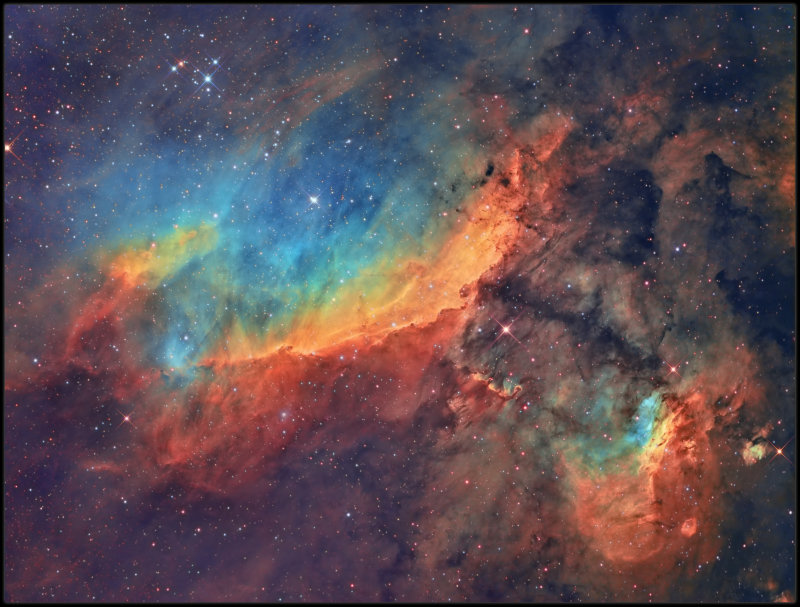
The Cat's Paw:
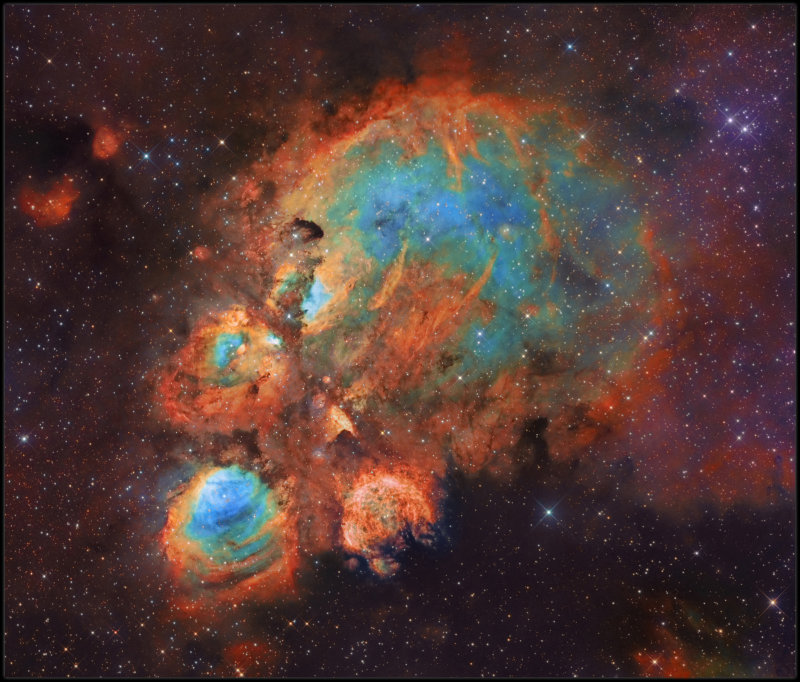
M31:
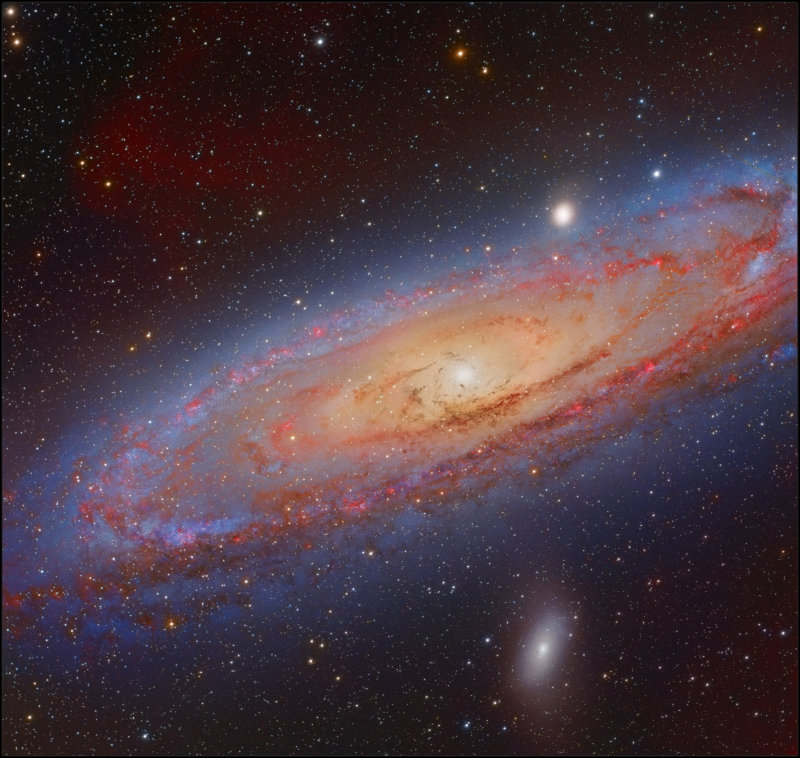
M110:
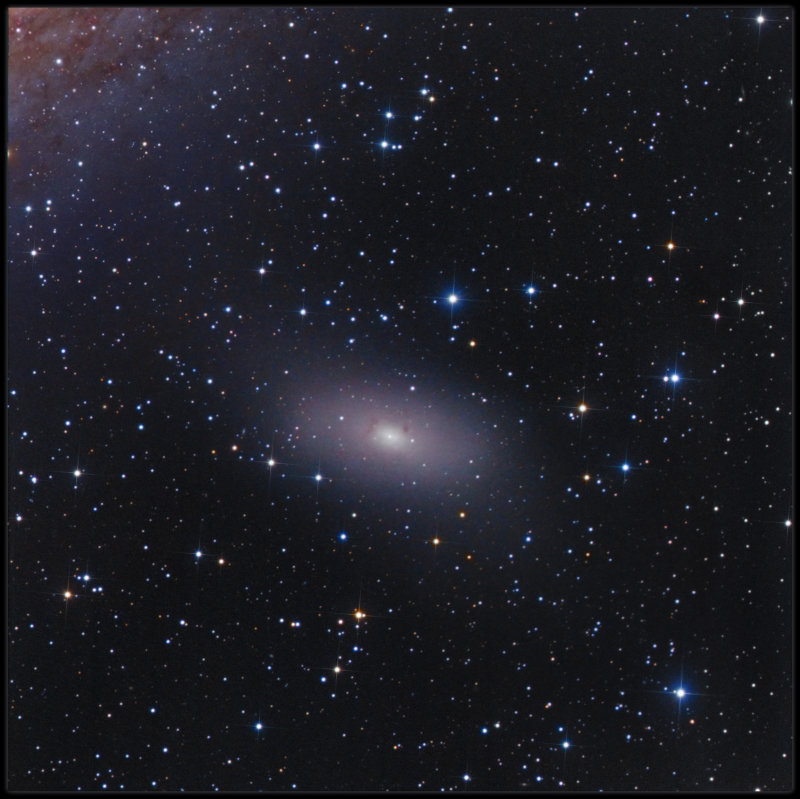
A Starles Horsehead:
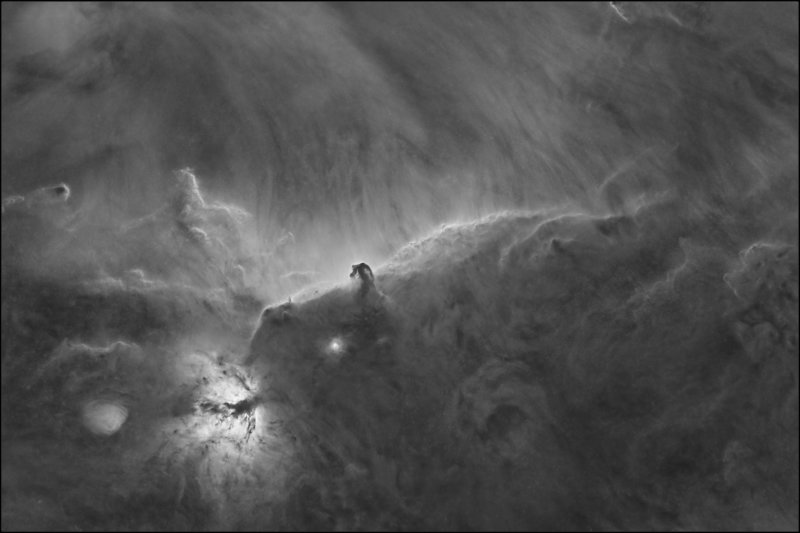
Finally had some time to process images from the last visit in Tivoli farm, Namibia.
Since the images posted here are greatly resolution reduced - please visit my gallery for full details and resolution:
https://pbase.com/tango33/new_images
Thank you,
Kfir Simon
The Prawn nebula:

The Cat's Paw:

M31:

M110:

A Starles Horsehead:

-
dvd007
- Ensign
- Posts: 37
- Joined: Wed Jul 08, 2015 7:54 am
- Location: Saint Paul Lès Dax, France
- Contact:
Re: Submissions: 2022 February
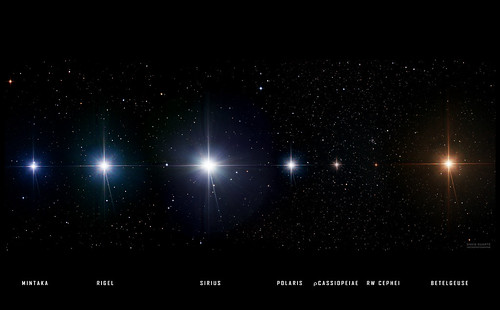 STARS COLORS by David Duarte, sur Flickr
STARS COLORS by David Duarte, sur FlickrI wanted to recreate the spectral classification of stars from my own photos of stars as we know it in astrophysics.
I captured all the stars in one night with exactly the same exposure time and focal length to really compare them. (10x5s exposure on each color layer RVB)
Private observatory St Paul Lès Dax France
10/02/2022
Telescope 200/1000 PERL
Diameter (mm) 200
Focal (mm) 1000
Rapport F/D 5
Mount AZEQ6GT PRO
Camera guide ZWO ASI120MC-S
Caméra acquisition ZWO 1600MM PRO
R 10x5s
V 10x5s
B 10x5s
Re: Submissions: 2022 February
I just love it! Thank you, thank you, thank you! Thank you so much for really comparing the visual color of stars, and, not least, really showing us that bluish stars truly are different shades of blue!dvd007 wrote: ↑Sat Feb 12, 2022 11:17 pmSTARS COLORS by David Duarte, sur Flickr
I wanted to recreate the spectral classification of stars from my own photos of stars as we know it in astrophysics.
I captured all the stars in one night with exactly the same exposure time and focal length to really compare them. (10x5s exposure on each color layer RVB)
Private observatory St Paul Lès Dax France
10/02/2022
Telescope 200/1000 PERL
Diameter (mm) 200
Focal (mm) 1000
Rapport F/D 5
Mount AZEQ6GT PRO
Camera guide ZWO ASI120MC-S
Caméra acquisition ZWO 1600MM PRO
R 10x5s
V 10x5s
B 10x5s
Ann
Color Commentator
-
Guest
Re: Submissions: 2022 February
Dear editors,
here is my 2022 Jellyfish IC 443 capture from nice Andalusian Bortle 4 sky.
TS 76EDPH - reducer to f 4.5
ASI 2600 Mono / Antlia Pro 3nm
43h in total
 Jellyfish IC443 - Andalusia - 900 by Martin Hochbruck, auf Flickr
Jellyfish IC443 - Andalusia - 900 by Martin Hochbruck, auf Flickr
here is my 2022 Jellyfish IC 443 capture from nice Andalusian Bortle 4 sky.
TS 76EDPH - reducer to f 4.5
ASI 2600 Mono / Antlia Pro 3nm
43h in total
 Jellyfish IC443 - Andalusia - 900 by Martin Hochbruck, auf Flickr
Jellyfish IC443 - Andalusia - 900 by Martin Hochbruck, auf Flickr

